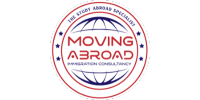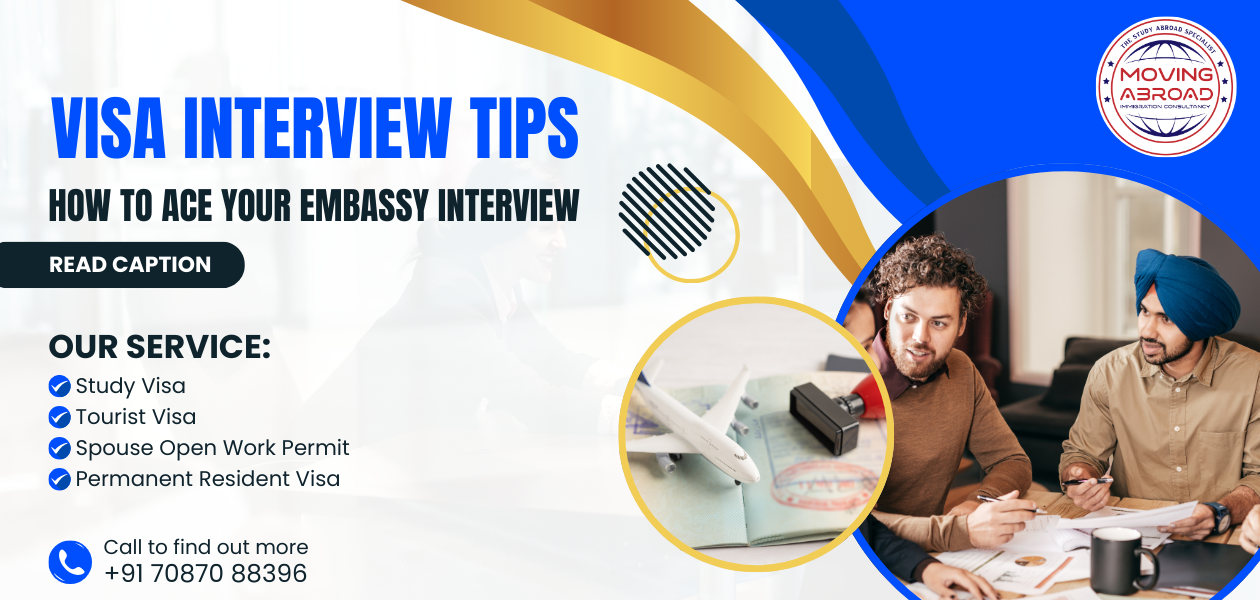The visa interview is often one of the most critical and nerve-wracking stages of the immigration or visa application process. This interview is the point where the visa officer will assess whether you’re a genuine applicant and whether you meet the requirements for the visa you’re applying for. While the process can seem intimidating, being well-prepared can greatly improve your chances of success. In this guide, we’ll cover key visa interview tips to help you ace your embassy interview.
1. Understand the Purpose of the Interview
- Why It Matters: The visa officer’s primary goal is to verify the information in your application, assess your intentions, and ensure that you meet the requirements for the visa. They need to ensure that you won’t overstay your visa or engage in illegal activities.
- What You Should Know: Depending on the type of visa you’re applying for, the interview questions will focus on different aspects:
- Student Visa: The officer will likely ask about your study plans, chosen course, university, funding, and future career goals.
- Work Visa: You may be asked about your job offer, employer, and your qualifications for the role.
- Tourist Visa: Expect questions about your travel plans, purpose of visit, ties to your home country, and financial ability to support your trip.
- Immigrant Visa: The focus will likely be on your reason for immigration, your ties to the country you’re moving to, and how you plan to integrate.
2. Be Honest and Clear in Your Responses
- Why It Matters: Visa officers are trained to detect inconsistencies or evasive answers. Providing false or unclear information can lead to an immediate denial or even a ban from future visa applications.
- How to Prepare: Review your visa application and supporting documents thoroughly before the interview. Make sure the information you provide during the interview matches your application. If you don’t know the answer to a question, it’s better to say so than to guess or give misleading information.
- What You Should Do: Always answer questions clearly, confidently, and truthfully. If your circumstances have changed since submitting the application, explain the changes with valid reasoning.
3. Be Prepared for Common Questions
- Why It Matters: While each visa interview will have unique elements depending on your individual case, certain questions are common across most interviews.
- What to Expect: Below are some typical visa interview questions based on the type of visa:
- For Student Visas:
- Why did you choose this country/university/program?
- How do you plan to finance your education?
- What are your career plans after graduation?
- For Work Visas:
- Can you describe your job offer?
- What qualifications or experience make you suitable for this role?
- How long do you plan to work in this country?
- For Tourist Visas:
- What is the purpose of your visit?
- How long will you stay, and where will you stay?
- Do you have ties to your home country (e.g., family, job, property)?
- For Immigrant Visas:
- Why do you want to move to this country?
- Do you have family or job opportunities in the country?
- How will you support yourself while settling there?
- For Student Visas:
- How to Prepare: Prepare thoughtful, concise answers to these questions that show you have researched your situation and that you are a genuine applicant.
4. Bring All Required Documents
- Why It Matters: Forgetting important documents can lead to delays, rescheduling, or even rejection. Your documents provide evidence for the answers you give in the interview.
- What to Bring: Always check the embassy’s website or consult your immigration consultant for a detailed list of required documents. Some common documents include:
- Passport (valid and with sufficient blank pages)
- Visa application form and confirmation receipt
- Passport-sized photographs as per the specified format
- Appointment confirmation for the interview
- Financial documents (bank statements, scholarship letters, or sponsorship letters)
- Proof of ties to your home country (job letters, property ownership, family details)
- Acceptance letters from universities (for student visas)
- Job offer letters and contracts (for work visas)
- How to Organize: Have a well-organized folder containing all your documents, arranged in the order they are likely to be requested. Make sure your documents are up-to-date, legible, and complete. Double-check that none of your documents are missing or expired.
5. Dress Appropriately
- Why It Matters: Your appearance can create a strong first impression. Dressing professionally signals respect for the process and shows that you take the interview seriously.
- What to Wear: You don’t need to wear a suit unless applying for a business or professional work visa, but dress smartly and neatly. Business casual attire (a collared shirt, dress pants, or a modest dress) is generally appropriate.
- What to Avoid: Avoid casual wear such as jeans, t-shirts, or sneakers. Keep accessories and jewelry minimal, and ensure your overall look is polished and professional.
6. Stay Calm and Confident
- Why It Matters: The way you present yourself during the interview can influence the visa officer’s perception of you. Appearing nervous, evasive, or unprepared might raise concerns about your intentions.
- How to Stay Calm: Practice your responses with a friend or family member beforehand to help reduce anxiety. If English is not your first language, consider practicing in English to boost your confidence, or request an interpreter if the interview can be conducted in your native language.
- What to Do: During the interview, maintain eye contact, sit up straight, and speak clearly. If you don’t understand a question, politely ask for clarification instead of guessing or fumbling for an answer.
7. Demonstrate Ties to Your Home Country
- Why It Matters: For non-immigrant visas (such as tourist, student, or work visas), one of the biggest concerns for visa officers is whether you will return to your home country after your visa expires. Demonstrating strong ties to your home country can reassure them of your intent to return.
- What to Provide: Documents or explanations that show you have strong reasons to return home could include:
- Family ties (parents, spouse, children living in your home country)
- Employment ties (a stable job, letter from employer promising return)
- Property ownership (house, land, or business in your home country)
- Financial ties (investments, savings, or ongoing financial obligations)
- How to Present This Information: Be ready to explain why you intend to return to your home country after your visit or study period. Avoid vague responses like “I love my country” and instead focus on concrete reasons like job prospects, family responsibilities, or personal assets.
8. Prepare for Personal Questions
- Why It Matters: Some visa interviews may include personal or probing questions to assess your character, intentions, and background. While this may feel intrusive, it’s a part of the evaluation process.
- What to Expect: You may be asked about your marital status, criminal record, past travel history, or other personal aspects. These questions are especially common in cases where the visa officer wants to ensure that you are not likely to overstay or abuse the visa.
- How to Respond: Be open and truthful. If asked about sensitive matters (such as a previous visa rejection or a criminal conviction), provide factual and honest answers without becoming defensive. If applicable, explain what has changed since any previous issues.
9. Know Your Itinerary (For Tourist and Student Visas)
- Why It Matters: If you’re applying for a tourist or student visa, the officer may ask you to describe your travel or study plans in detail. This is to ensure that your intentions are genuine and that you are well-prepared.
- What to Explain:
- For Tourist Visas: Be ready to provide details about your travel dates, destinations, accommodation, and activities. Have proof of your return flight and hotel reservations, or provide details of any family members or friends you’ll be visiting.
- For Student Visas: You should clearly explain why you chose the particular course, university, and country. Show that you’ve researched the program and explain how it fits into your long-term career goals.
- How to Prepare: Bring any supporting documents (itinerary, flight bookings, accommodation confirmation, university acceptance letters) and be prepared to explain your choices confidently.
10. Don’t Argue or Dispute the Officer’s Decision
- Why It Matters: If your visa application is denied during the interview, arguing or becoming confrontational won’t change the outcome and may harm future applications.
- What You Should Do: If your visa is denied, remain calm and professional. Ask for clarification about the reasons for rejection so that you can address them in a future application. In some cases, the officer may suggest areas for improvement or indicate what additional information you need to provide in a subsequent application.
- How to Move Forward: Take notes on the feedback you receive and work with a qualified immigration consultant to strengthen your application if you decide to reapply.
Conclusion
The visa interview can be a critical step in your immigration or travel journey, but with proper preparation, you can significantly increase your chances of success. The key is to understand the purpose of the interview, remain honest and transparent, and demonstrate your genuine intent. By practicing common questions, organizing your documents, dressing appropriately, and staying calm under pressure, you can present yourself as a well-prepared and confident applicant.
Remember, the visa officer’s primary goal is to assess your eligibility and ensure that you meet the requirements for the visa. Be respectful, truthful, and concise in your responses. If you are rejected, don’t be discouraged—use the feedback to improve your application and try again.
Whether you are applying for a student, work, tourist, or immigrant visa, these tips will help you navigate the process with confidence and clarity. The better prepared you are, the more likely you are to ace your visa interview and move one step closer to achieving your travel or immigration goals.





